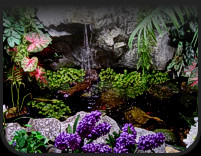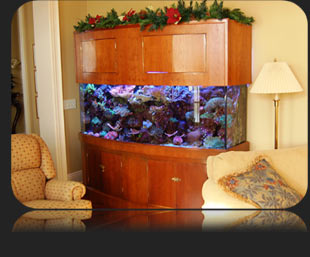 |
home page Aquarium Adventure carries the widest selection of aquariums, fish, corals & plants. |
| ABOUT USAQUATIC PROFESSIONALSLOCATIONSTIP SHEETSFRANCHISE |
 |
||
| We offer everything from do-it-yourself pond equipment and starter sets to full custom installation packages. Our experts can answer those really tough questions about installing and maintaining garden ponds...a service the hardware stores cannot provide. Come visit our store and take a tour! |
||
 |
||
 |
||
|
||
 |
||
Although algae may appear to be “dirty” as it can grow on and cover the aquarium glass, substrate, plants and decorations---it really is beneficial to the overall water quality and the health of the animals in the aquarium. What is important is keeping it under control and not let it get excessive. Algae are beneficial to the aquatic ecosystem in several ways. First and foremost it is a food source to many of the animals (especially herbivores) living in the aquarium providing nutrients and fiber. Algae also provide oxygen to the water and takes up carbon dioxide (the respiration waste product from the animals). Finally, it utilizes (absorbs) nitrates, which are the final end product of the nitrogen cycle – an ever important biological function and filtration process occurring in the closed system of an aquarium. There are many forms of algae, usually falling into 4 color categories; green, blue-green, red and brown and all grow in response to nutrients and light. The color of algae growing will indicate the types of nutrients and light spectrum feeding it. Light is very important in the aquatic ecosystem as it provides energy to the animals and plants living there, however it is the most important limiting factor in controlling algae. If algae grows too fast and covers everything in the aquarium, then the aquarium is getting too much light. Light should be on 10 to 12 hours a day and 12 to 14 hours of darkness. Light on more than 12 hours a day will cause excessive algae growth. High levels of nitrates and phosphates in the aquarium water can also cause excessive algae but always in conjunction with too much light. By controlling the amount and length of light and the nutrient level in the aquarium we can control and minimize algae growth. The aquarium will never be sterile of algae as light will always make some algae grow, so when it comes time to clean it there are many products that can help. Scrubber pads, magnets and scrapers can be used on the aquarium glass, decorations can be pulled out and scrubbed and of course there are types of animals (fish, snails and shrimp) that will eat and control the algae in the aquarium.
View All Fish Keeping Tip Sheets & FAQs
|
||

 Algae is a problem in my aquarium, it looks dirty. What can I do to control it?
Algae is a problem in my aquarium, it looks dirty. What can I do to control it?